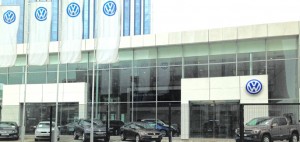As the Volkswagen emission scandal continues around the world, with the United States discovering more cars with cheat tests, the Consumer Protection Council (CPC) has given Volkswagen Nigeria a seven-day ultimatum to provide information on the status of its vehicles in relation to the “emissions cheating software”, which has reportedly affected 11 million cars worldwide.
The ultimatum followed a petition written earlier by the Socio-Economic Rights Accountability Project (SERAP), calling for caution over the emission cheating software.
The CPC, in a letter to the automaker dated October 26, 2015, signed by its Director General, Mrs. Dupe Atoki, said: “the attention of the Council has been drawn to some publications wherein Volkswagen has admitted the allegation that certain illegal “defeat device” software was installed in Volkswagen vehicles to cheat emission test.
“The resultant effect of this on the environment and quality of these cars is of great importance to the CPC.
“The publications also indicated that Volkswagen had admitted that vehicles with 1.2, 1.6, and 2.0 litre EA 189 engines are all affected, (i.e. Golf, Beatle, Jetta and Passat models),” it added.
According to CPC, considering the Volkswagen market in Nigeria, the Council therefore, “requested Volkswagen Nigeria to within seven days of the receipt of its letter make available to it the number of affected vehicles in Nigeria (if any), steps taken to inform and sensitise consumers and efforts being made to facilitate quick recall of such vehicles in the country.”
The council noted that its directive was pursuant to the powers of the Council to compel manufacturers to give public notice of any hazard inherent in their products.
All cars sold in the UK have to undergo an official emissions test under European Union law. In the US, the official tests are carried out by the manufacturer and not witnessed by an independent third-party. The results are submitted to the US Environmental Protection Agency (EPA), which decides whether to accept them or test the vehicle itself. It is unclear whether any of the two processes is employed in Nigeria where the auto industry is dominated by used cars.





